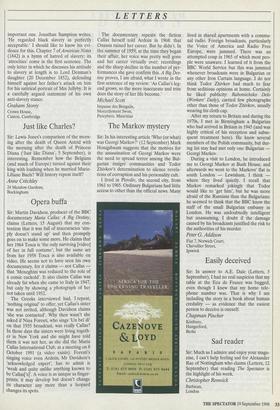The Markov mystery
Sir: In his interesting article 'Who (or what) was Georgi Markov?' (12 September) Mark Honigsbaum suggests that the motives for the assassination of Georgi Markov were the need to spread terror among the Bul- garian émigré communities and Todor Zhivkov's determination to silence revela- tions of corruption and his personality cult.
I lived in Plovdiv, the second city, from 1961 to 1965. Ordinary Bulgarians had little access to other than the official news. Many lived in shared apartments with a commu- nal radio. Foreign broadcasts, particularly the Voice of America and Radio Free Europe, were jammed. There was an attempted coup in 1965 of which most peo- ple were unaware. I learned of it from the BBC World Service but this was jammed whenever broadcasts were in Bulgarian or any other Iron Curtain language. I do not think Todor Zhivkov had much to fear from seditious opinions at home. Certainly he liked publicity: Rabotnichsko Delo (Workers' Daily), carried few photographs other than those of Todor Zhivkov, usually wearing his cloth cap.
After my return to Britain and during the 1970s, I met in Birmingham a Bulgarian who had arrived in Britain in 1945 (and was highly critical of his reception and subse- quent treatment here). He knew several members of the Polish community, but dur- ing his stay had met only one Bulgarian Georgi Markov.
During a visit to London, he introduced me to Georgi Markov at Bush House, and afterwards we went to the Markovs' flat in south London — Lewisham, I think where they lived quietly. I recall that Markov remarked jokingly that Todor would like to 'get him', but he was more afraid of the Russians than the Bulgarians: he seemed to think that the BBC knew the staff of the small Bulgarian embassy in London. He was undoubtedly intelligent but unassuming. I doubt if the damage caused by his broadcasts justified the risk to the authorities of his murder.
Peter G. Addison
Flat 7, Norwich Court, Chevallier Street, Ipswich










































































 Previous page
Previous page